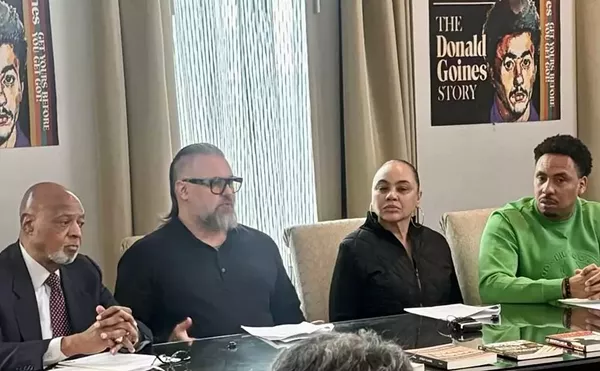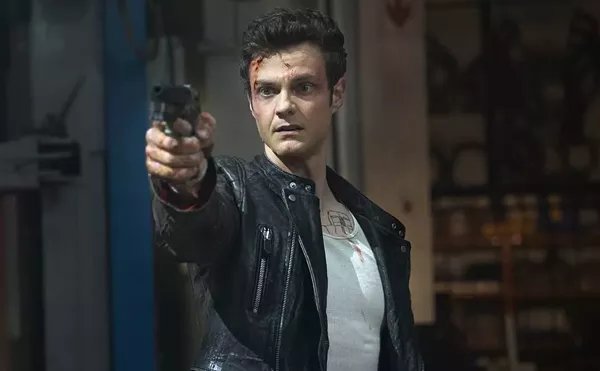Cradle Will Rock
1999
After he finished his "Detroit Industry" mural at the Detroit Institute of Arts, Diego Rivera decamped to New York to make an even more stridently political mural for Rockefeller Center. In one of his historical sleights of hand, writer-director Tim Robbins shifts that fiasco — in which Nelson Rockefeller had his own commission destroyed rather than tolerate Lenin's face in it — from 1933 to 1937 to make it contemporaneous with the groundbreaking lefty musical The Cradle Will Rock. And although the making of the musical under the auspices of the government's Federal Theatre Project is the center here, Robbins' film aspires to the breadth of a Rivera mural.
There are certainly enough historical figures to justify Robbins' conceit — the musical's director, Orson Welles (Angus Macfadyen), Rivera (Ruben Blades), Frida Kahlo (Corina Katt Ayala), composer Marc Blitzstein (Hank Azaria) and Nelson Rockefeller (John Cusack), to name just some. And beyond those are Robbins' fictional creations, from Bill Murray as a bitter, insecure conservative in a den of liberality to Emily Watson, the down-on-her-luck gal hoping to sing her way out of destitution. Labor strife, events that will lead to World War II, the House Un-American Activities Committee and the clashes over the promise and politics of the New Deal all jostle for attention with the story of the musical's creation, its cancellation by the powers that be and the circumventions of the producers, cast and crew to mount the show regardless.
Some critics have, not surprisingly, chided Robbins from cramming too much into Cradle Will Rock. But even if you agree, it's hard to watch without admiring the ambition and energy involved, or without being prodded — as Robbins intended — to think about the time being re-created in relation to our own. —W. Kim Heron
They Shoot Horses, Don't They?
1969
Based on Horace McCoy's 1935 novel of the same name, They Shoot Horses offers an unsparing look at what desperate people will endure in their attempt to survive hard times. The setting is a seemingly endless dance marathon where contestants vying for prize money are pushed to the breaking point and then beyond, as a smarmy emcee roils a crowd there to watch the misery unfold, step by exhausting step. Like the Great Depression itself, it is brutal and grim and unrelenting. —Curt Guyette
The Black Legion
1937
Before he vaulted to superstardom in the 1940s, Humphrey Bogart took on the lead in this inexpensive "social drama," playing Detroit autoworker Frank Taylor, a hardworking American who's irked that an immigrant has passed him over for a promotion in the shop. Though the setup sounds dated, Bogart makes it work as his character joins the KKK-like vigilante group the Black Legion, whose shadowy campaign of intimidation would silence pinkos and put newcomers back in their place. Of course, in this ripped-from-the-headlines issue picture, it works out badly for Bogart, who loses his family and more. As for the very real Black Legion, they usually didn't sound like Bogie, springing up among the mostly Southern white workers who poured into the industrial Midwest, especially Detroit. Upton Sinclair said of the Legion's members, "These men were mostly illiterate, but they were patriotic, and full of racial pride."
The Black Legion exposes a truly dark side of economic failure. When the basics of life are in short supply and competition for the scraps becomes fierce, ugly nativism can start to bare its canines, turning even good guys bad. —Michael Jackman
The Grapes of Wrath
1940
Not as hard-hitting or political as the novel it sprang from, this film, which won two Oscars and garnered several nominations, is still one hell of a movie. Henry Fonda turns in a stunning portrayal of Tom Joad, a man who comes to learn the importance of engaging in a struggle that is larger than himself. Particularly memorable are the words Tom, on the run from the law, uses to comfort his mother as he prepares to leave the family: "... I'll be all around in the dark. I'll be ever'where — wherever you can look. Wherever there's a fight so hungry people can eat, I'll be there. Wherever there's a cop beatin' up a guy, I'll be there. ... An' when the people are eatin' the stuff they raise, and livin' in the houses they build — I'll be there too."
"Seen the pitcher last night, Grapes of Wrath, best cussed pitcher I ever seen," wrote Woody Guthrie, who created the ballad "Tom Joad" after seeing the flick. —CG
Sullivan's Travels
1941
Writer-director Preston Sturges' comedy-drama masterpiece — the film that inspired O Brother Where Art Thou — starts out as a slapstick romance, with Hollywood director Sullivan (Joel McCrae) going on the bum to study the real lives of the people for an important, socially conscious film about the plight of the poor. But when his wanderings leave him falsely imprisoned and given up for dead, his sufferings on a prison work gang are about as serious as a comedy can get. In a surprising reversal, by the time Sullivan is free, despite all his efforts to study hardship and poverty, he decides that downtrodden people really don't need preachy films that focus on problems; what they is need laughter, eye candy and escapist fun. On the eve of World War II — the film was released in December 1941 — Sturges made this unusual premise work.
Lesson: No matter how tough things get, look for laughter. It lightens the burden. —MJ







